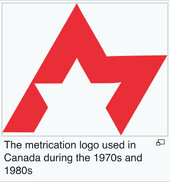Well, let's fix that metric conversion rubbish and just stick with gallons, so we all know what we mean... ...oh wait



mW and MW maybe? though should be obvious by context being 10^9 apart


I think that is the biggest stumbling block non-electro-nerds have. But if you explain it in terms of miles/hour vs. miles (oops sorry, that's kilometes/hour vs. kilometers, for those that live abroad

), then it (usually) makes sense to them.
Denier still confuses me though... where did "grams per 9,000 metres of yarn" come from?
Metric ,,, I lived thru it in the 70s;


en.wikipedia.org
The thing is ,,, in Science it makes things easy & for the most part it is based around the most abundant compound on Earth ,,, Water.
Watt

,,, er I mean What ??
1 L of water = 1 Kg
Volume 1M by 1M by 1M = 1000 L = 1000Kg = 1 Metric Tonne
Canada ,,, English / French ,,, Imperial & Metric ,,, Fuel gauges on the fritz ,,, Doesn’t really spell disaster does it

;
For those who don’t know, there are 2.2 lbs in a Kg ,,, if you are fueling a commercial jet with a unit conversion speaking 2 languages ,,, maybe the international hairy eyebrow is a better form of communication ,,, oh & get the fuel tank level indicator fixed ,,, good thing the Captain was a glider pilot.
TLTR ?;
This;
 Is Metric for This;
Is Metric for This;








